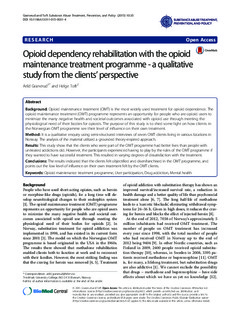Opioid dependency rehabilitation with the opioid maintenance treatment programme - a qualitative study from the clients’ perspective
Abstract
Background Opioid maintenance treatment (OMT) is the most widely used treatment for opioid dependence. The opioid maintenance treatment (OMT) programme represents an opportunity for people who are opioid users to minimize the many negative health and societal outcomes associated with opioid use through meeting the physiological need of their bodies for opioids. The purpose of this study is to shed some light on how clients in the Norwegian OMT programme see their level of influence on their own treatment. Method It is a qualitative enquiry using semi-structured interviews of seven OMT clients living in various locations in Norway. The analysis of the material utilized a grounded theory-inspired approach. Results This study show that the clients who were part of the OMT programme had better lives than people with untreated addictions did. However, the participants experienced having to play by the rules of the OMT programme if they wanted to have successful treatment. This resulted in varying degrees of dissatisfaction with the treatment. Conclusions The results indicated that the clients felt objectified and disenfranchised in the OMT programme, and points out the low level of influence on their own treatment felt by the OMT clients.

